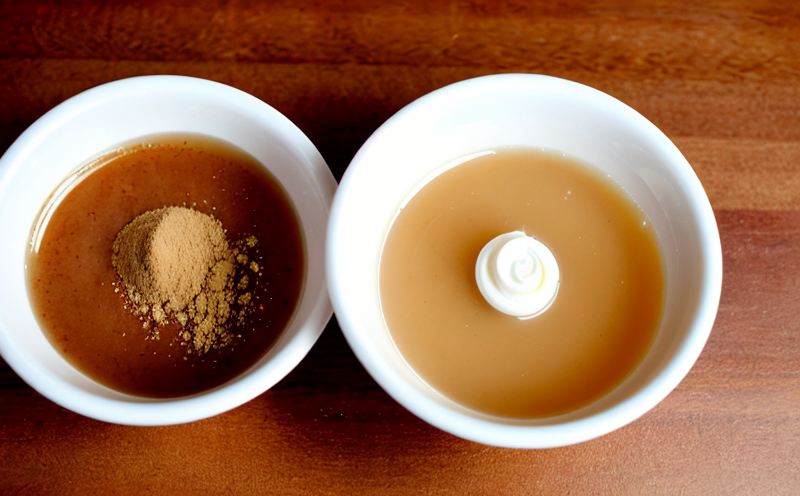USP 1225 Flavor Analytical Method Validation Testing
The USP 1225 flavor analytical method validation testing is a critical component in ensuring that sweetener and flavor compounds meet the stringent quality standards set forth by the United States Pharmacopeia. This service focuses on validating analytical methods used to assess the purity, identity, strength, and composition of these ingredients. The primary goal is to ensure that the methods employed are accurate, precise, and robust enough to provide reliable results.
The process involves a series of steps designed to evaluate different aspects of the analytical method, including linearity, precision, accuracy, specificity, and robustness. Linearity ensures that there is a consistent relationship between the concentration of the analyte and the response of the method over the range of concentrations expected in real-world samples. Precision assesses how closely replicate measurements agree with each other under defined conditions.
Accuracy checks whether the measured values are close to the true value, while specificity ensures that only the target compound is detected without interference from other substances. Robustness evaluates the method's ability to withstand variations in experimental conditions such as temperature or matrix effects. These tests are essential for ensuring compliance with regulatory requirements and maintaining product quality.
For sweetener and flavor compounds, this testing also includes evaluation of stability under various storage conditions and exposure to different environmental factors. This ensures that the ingredients remain stable throughout their shelf life and do not degrade prematurely. The validation process is critical in R&D phases as it helps identify potential issues early on and optimizes formulation processes.
The use of advanced analytical techniques like High-Performance Liquid Chromatography (HPLC), Gas Chromatography-Mass Spectrometry (GC-MS), and Fourier Transform Infrared Spectroscopy (FTIR) allows for precise quantification and qualitative analysis. These instruments provide detailed information about the chemical structure and purity of sweetener and flavor compounds, which is crucial for meeting USP standards.
Compliance with USP 1225 not only enhances product quality but also builds consumer trust by ensuring consistency across batches. It helps manufacturers meet stringent regulatory requirements and avoid recalls or legal actions due to non-compliance. For R&D teams, this service provides invaluable insights into the performance of new formulations, aiding in process optimization.
Our laboratory employs experienced scientists who possess deep knowledge of USP 1225 guidelines. They use cutting-edge equipment calibrated according to international standards to perform these tests accurately and consistently. This expertise ensures that we deliver reliable results every time, meeting both internal quality control needs and external regulatory demands.
Applied Standards
| Audience | Standards Applied |
|---|---|
| Quality Managers, Compliance Officers | USP 1225, ISO/IEC 17025 |
| R&D Engineers, Procurement Specialists | ASTM D6473-19, EN 382:2012 |
The USP 1225 flavor analytical method validation testing strictly adheres to the guidelines provided by various standards bodies. These include the United States Pharmacopeia (USP), International Organization for Standardization (ISO)/International Electrotechnical Commission (IEC) ISO/IEC 17025, ASTM D6473-19, and European Norm EN 382:2012. Compliance with these standards ensures that the testing process is rigorous and meets industry best practices.
USP 1225 specifically outlines requirements for validating methods used in pharmaceuticals and related products, including sweeteners and flavors. ISO/IEC 17025 provides accreditation criteria for testing laboratories to ensure they meet internationally recognized standards of quality management systems. ASTM D6473-19 focuses on the evaluation of analytical methods for organic compounds, while EN 382:2012 covers sampling procedures and sample preparation.
By adhering to these strict guidelines, our laboratory ensures that all tests conducted are reliable and reproducible. This adherence also facilitates seamless integration into larger supply chain processes where traceability and consistency are paramount.
Industry Applications
The USP 1225 flavor analytical method validation testing finds extensive application across various sectors within the food, pharmaceutical, and beverage industries. In these fields, ensuring that sweeteners and flavors meet strict quality criteria is essential for maintaining product safety and efficacy.
In the food industry, this testing helps manufacturers comply with FDA regulations while also enhancing consumer confidence through consistent taste profiles. For pharma companies developing new formulations or improving existing ones, USP 1225 ensures that active ingredients are accurately measured and identified. In beverages, especially those targeting health-conscious consumers, accurate flavor analysis is crucial for maintaining brand reputation.
By validating methods according to these stringent standards, laboratories like ours contribute significantly to the overall quality assurance framework of large corporations operating in these sectors. This not only aids individual companies but also supports broader industry standards aimed at protecting public health and promoting innovation.
Quality and Reliability Assurance
- Linearity testing: Ensuring consistent results across concentration ranges.
- Precision assessment: Measuring variability in replicate samples.
- Accuracy checks: Comparing measured values against known reference standards.
- Specificity evaluations: Confirming detection of only the intended compound.
- Robustness tests: Assessing method performance under varying conditions.
Quality assurance is integral to our USP 1225 flavor analytical method validation testing service. We employ rigorous protocols and state-of-the-art instrumentation to ensure reliable and reproducible results. Our team of experts closely follows international standards such as ISO/IEC 17025, ASTM D6473-19, and EN 382:2012 to maintain the highest level of accuracy and precision.
These measures are crucial not only for meeting regulatory requirements but also for fostering trust among stakeholders. By providing consistent and accurate data, we help our clients build robust quality assurance programs that stand up to scrutiny from regulatory bodies and third-party auditors alike.





